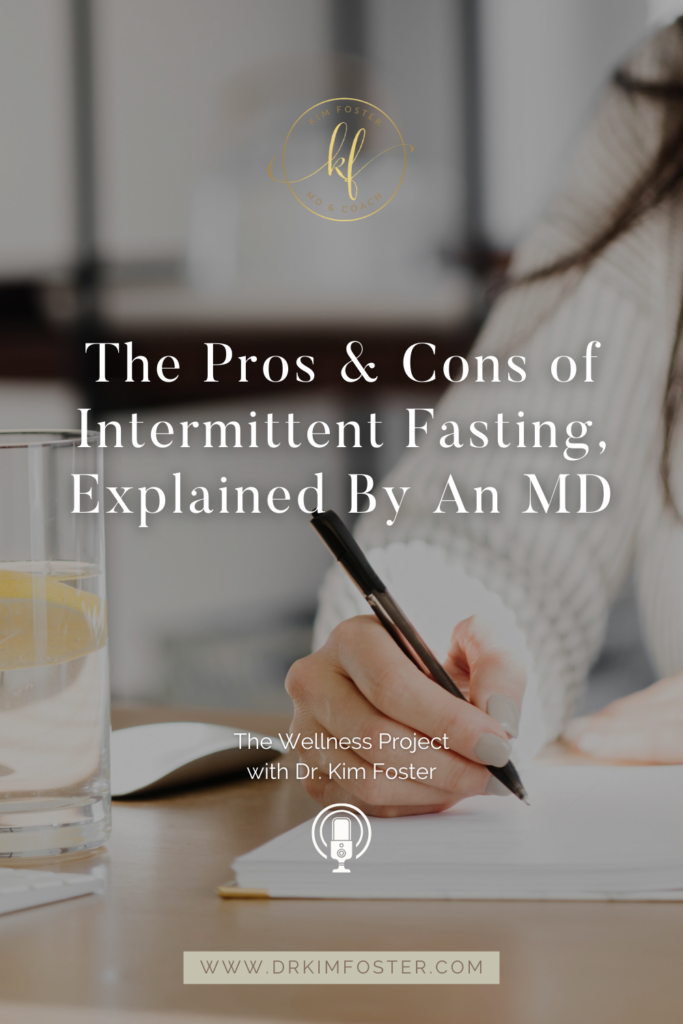Have you set an intention for 2024 to optimize your health and are toiling with the idea of giving intermittent fasting a go?
If so, you’re likely wondering, is intermittent fasting right for YOU?
In this week’s article and YouTube video, I’ll help you decide.
I’m breaking down the pros AND the cons of fasting so that you can get a balanced picture and make an informed decision.
What Is Intermittent Fasting?
Unlike other diets, IF is not about WHAT you eat but WHEN you eat. In short, it’s about creating and sticking to a schedule where you eat during a specific period and fast during another.
There are various methods, like the 16/8 (16 hours fasting and 8 hours eating) or the 5:2 (5 days normal eating and 2 days restricted eating).
I’ve created many past videos explaining Intermittent Fasting, which you can check out if you are new to this idea.
Pros of Intermittent Fasting
So let’s talk about the benefits of Intermittent Fasting, starting with the most commonly known one…
Pro #1: Weight Loss
While it is no magic remedy, many people find fasting, especially the 16/8 method, is highly effective at helping them shed those extra pounds.
Why?
Because restricting food for an extended period triggers your body’s fat-burning “mode.” So, during your fasting hours, your body taps into fat stores, transforming them into energy.
This burning of stored energy also leads to the following benefit…
Pro #2: Metabolism Boost
Research has found that during fasting periods, your body stimulates the production of various hormones, including norepinephrine and growth hormone.
These hormonal changes promote the breakdown of fats (lipolysis) and encourage fat burning, which, in turn, boosts your metabolic rate.
Pro #3: Insulin Sensitivity and Blood Sugar Control
Did you know intermittent fasting may help to treat insulin resistance in people with diabetes and pre-diabetes?
How?
Well, insulin is the primary driver of fat storage. The more often you eat, the more insulin production you trigger.
So, fasting for 16 hours allows the body to rest and blood insulin levels to drop. This improved insulin sensitivity allows your body to handle glucose more efficiently.
Pro #4: Cellular Repair and Longevity
Yes, following IF may save you money on those expensive anti-aging treatments!
Intermittent fasting triggers a process known as autophagy. In simple terms, this is a process where your body clears out damaged cells and regenerates new, healthy ones.
Why is this important?
- Too many damaged cells in the body can cause age-related diseases
- Cell regeneration promotes longevity
Pro #5: Mental Clarity and Focus
IF doesn’t just help to optimize your body’s functions but also your brain’s processes.
Ketone production is stimulated whenever our body burns fats during a fasting period. Ketones are an alternative energy source for the brain.
Research has found that entering ketosis can improve mental clarity, focus, and memory – which is something I personally experience from IF.
Pro #6: Simplicity and Flexibility
Let’s not underestimate the simplicity of intermittent fasting as a health or weight loss method. Unlike diets, you can still eat all your favorite foods and don’t have to follow any complicated meal plans or count calories or macros.
It’s also very flexible. Although many people who practice the 16:8 IF method choose to skip breakfast and start their eating window at lunchtime, there is no rule about when you can and can’t eat. So you can schedule it around your lifestyle, ensuring you can eat when you need energy the most.
Pro #7: Potential Cancer Protection
One of the latest potential benefits of IF is cancer prevention. While the research is not yet conclusive, fasting periods may create an environment in our bodies that limits cancerous cells’ adaptability, survival, and growth.
Pro #8: Improved Heart Health
As mentioned, intermittent fasting can lower the risk of weight gain and diabetes, which are two risk factors for heart disease. Moreover, fasting may increase the production of a key protein that controls inflammation, blood pressure, and cholesterol levels.
Cons of Intermittent Fasting
While intermittent fasting has many incredible potential benefits, there may be some downsides.
Con #1: Potential Nutrient Deficiencies
When we have a limited eating window, ensuring we consume all the essential nutrients we need each day can become more challenging.
Therefore, when following IF, pay extra attention to what you eat, opting for the most well-rounded, nutritionally dense meals.
Con #2: Difficulty in sticking to it
Our lifestyles are constantly changing, so our IF schedule can sometimes clash with other plans. For example, if your specific fasting schedule requires you to skip breakfast but your friends invite you out to try a new breakfast place, this will pose some social challenges.
These social challenges can also lead to this…
Con #3: Potential Negative Impact on Relationship with Food
While IF does not restrict WHAT you can eat, it does restrict WHEN you can eat. And any restriction in our diet has the potential to foster an unhealthy relationship with food.
The strict time restrictions could lead to an all-or-nothing mentality. As you can only eat during a specific period, you might binge or overeat because you fear you will get hungry.
Therefore, IF is not suitable for people with a history of eating disorders. And on the subject of suitability, it’s important to remember the following…
Con #4: Intermittent Fasting isn’t Suitable for Everyone
While many people find IF beneficial, it is not for everyone. In particular, fasting may not be suitable for pregnant women, children, or athletes with high-energy demands. Moreover, consult your GP before trying IF if you have any existing health conditions.
Con #5: Hormonal Issues for Women
Some women, especially those who experience severe PMS symptoms, find fasting to be highly challenging during their period.
The hormonal fluctuations that occur during the menstrual cycle can affect our energy levels, appetite, and mood, impacting how we respond to fasting. For example, during the luteal phase, you might experience increased appetite, which makes it difficult to go 16 hours without eating.
Final Thoughts
Because Intermittent Fasting is different for everyone, it’s impossible to know which of these pros and cons you will experience. So, give it a go and see how you feel.
But before you do, check my top tips on getting started with Intermittent Fasting the RIGHT way, which I share in the full YouTube video here:
And share with me how you get on. Which of these pros and cons did you experience?
Let me know in the comments below, or find me on Instagram and send me a DM!
Resources Mentioned:
Download my FREE 10 tips to Intermittent Fasting guide for further advice.
More Helpful Resources:
- Download my FREE Marketing Checklist for Health Coaches: 12 Ways To Get Clients https://drkimfoster.com/checklist
- My Free Class: How To Build A 6-Figure Health Coaching Business Using One Signature Program
- Kim on Instagram: https://www.instagram.com/drkimfoster/

FREE CLASS!
Looking to take your wellness journey to the next level?
The 3 Secrets For Stepping Into A Meaningful New Career Without Wasting Time Or Money
- find out why health & wellness coaching is a skyrocketing industry that can provide the freedom and fulfillment you’ve been craving
- discover the 3 biggest myths about health & wellness coaching that will hold you back (and what the truth is instead)
- learn the secret sauce for getting amazing results for your clients (and building a profitable business as a wellness coach)
…and more!

Subscribe to my Podcast:






